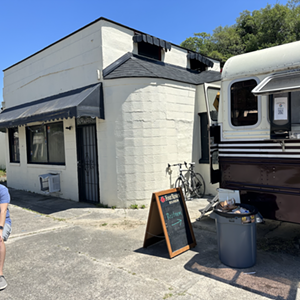To begin the story of the region's organic and local food supply, let's go to the very beginning: The chicken.
Or is it the egg?
Regardless, the pair live harmoniously in rural Screven County. When GA17 veers more northerly, and becomes a two-lane gray ribbon that cuts its way through towering pine forests and swampy flatlands, the farmlands begin to emerge.
Beans and cotton are still young. Corn stalks glistening beneath sweeping irrigation machines flourish -- but much of this land lies unused, in testimony to South Georgia's hardscrabble farm life. Clay soil holds too much or too little moisture, the heat is unrelenting and most small farmers gave up long ago trying to combat rising costs, lower commodity prices and endless regulations.
But on a mere six acres near the intersection of GA 17 and Dover Road, some folks are making a go of small farmsteading -- by selling eggs from pasture-raised chickens, blueberries from 50-year-old bushes and baking breads from all natural ingredients.
Ari-Anne McGinnis and Elliot McGann, are business partners in Adcote Acres, where they tend equal flocks of White Leghorns and Rhode Island Reds. Ari-Anne's life-partner Mark Becker helps -- and bakes breads sold at area farmer's markets. Whitney Greene, a full-time student and friend, helps when she can between course work.
"We're not a bunch of hippies living in a commune. But we do live here cooperatively as a means to make this work -- and we live very well," Ari-Anne, 23, says.
"We have 700 hens, half White Leghorns and half Rhode Island Reds, that produce about 300 dozen eggs a week The Rhode Island produces these brown eggs - and are fed with commercial organic feed. The white eggs come from the leghorns and are fed with Clark and Sons feed."
The flocks are segregated -- let out of coops to forage the large, grassy field at different times. Amazingly, the high grass is virtually insect free -- a sign that these voracious omnivores are hard at work.
"Most people think they just eat feed," Elliott, 27, says. "But the truth is, they really like bugs. They are scratch and peck feeders."
And that's just one difference between these eggs and a commercially produced egg -- these hens are under no stress, they get lots of natural proteins (like insects) and don't get supplements like antibiotics or vitamins. The simplest way to see the difference is to crack a grocery store egg -- and an egg from Adcote Acres.
"See," Ari-Anne says, pointing to the two yolks bobbing around in a bowl. "The commercial egg is very light yellow, ours is deep yellow -- and it gets that way naturally without any dietary additives."
There's also a difference in viscosity -- the Adcote egg's yolk is thick and rich feeling. The eggs are hand-washed and packed -- and never bleached bright white like mass-produced eggs. They'll keep for up to 45 days in refrigeration.
Back in the 116-year-old farmhouse (built for the daughter of a former Central of Georgia Railroad "Nancy Hanks" conductor) 100 new black and white Australorp chicks cheep and peep around a makeshift "chick arena" sitting to one side of the dining room. Heat lamps keep the days' old chicks warm before being moved into outdoor structures designed to keep the young chicks safe.
The farm is changing breeds -- a plan to reduce the overall flock size while not losing a proportional amount of egg production. The breed are legendary layers -- in 1922-23, a team of six hens set a world record of 1,857 eggs at an average of 309.5 eggs per hen for a 365 consecutive day trial.
An equal number of Barred Rocks are in the wings -- both breeds are docile, large, long-lived birds with a tendency to high egg production.
And what about environmental impact -- an ongoing criticism of big egg or chicken producers?
"Because we are pasture raising, feeding naturally and moving coops around the property, there is no smell," Ari-Anne explains. She shows off a handful of their chicken waste and straw -- which barely possesses an ammonia scent -- and only when held right under the nose. In contrast, she pokes a hole into what look s like a pile of black slag on the back of the property -- a pile of left over chicken waste from a previous tenant. The pile has been there for a couple of years - and emits a noxious scent from several feet away. It shows no signs of breaking down into usable compost.
"That's from chickens raised on one square foot of ground in a warehouse," Ari-Anne says. "Which egg would you rather eat?"
Savannah-based Chef Cynthia Creighton-Jones has handled hundreds of dozens of eggs in her career. She immediately recognizes the difference she sees in Adcote Acres eggs that she buys nearly every week at the Trustee's Garden Farmer's Market.
"The yolks are always a deep yellow and just so perky," Creighton-Jones says. "They stand up firm in the whites -- which are clear and gelatinous, as they should be. I find these eggs smell a bit more egg-y -- finally an egg that smells like an egg."
But higher quality eggs that are up to one-third lower in cholesterol and higher in Omega-3 fatty acids don't come cheap. The eggs out-pace commercial eggs by more than $2 a dozen. Browns are $3.75 a dozen; whites $4.75. Still, when compared to eggs labeled "organic" in markets, the Adcote eggs are competitive.
But why don't the recycled cartons carry the "organic" label? Reasons are myriad and, in part, are caused by nonavailability of truly organic feeds and federal regulations that challenge low-capital start-ups like Adcote Acres.
Ari-Anne's retort is that Adcote practices "full transparency."
"Anyone can visit us at any time and see the labels on our feed bags, see the chickens, see how we handle eggs, and make their own decision about (our eggs)," she said.
Adcote Acres sells eggs, bread and berries every Tuesday at the Trustee's Garden Farmer's Market and most Saturdays at the Forsyth Park Farmer's Market.
www.adcoteacres.com



























